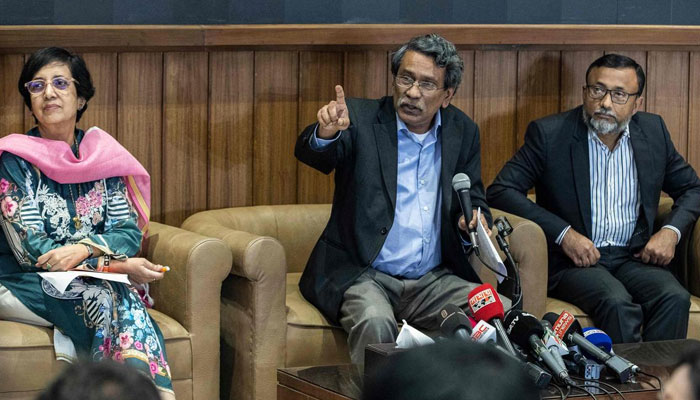Bangladesh vows to strip ‘fascism’ from constitution
Under current constitution, PM holds immense power, and centralisation of authority paves way for fascism: Riaz
DHAKA: Bangladesh’s constitutional reform commission, newly appointed in the wake of the student-led revolution that ousted long-time autocrat Sheikh Hasina, vowed Sunday to strip out “fascism” to safeguard democracy.
The commission must submit its recommendations to the interim government by December 31 -- part of sweeping changes promised by Nobel Peace Prize winner Muhammad Yunus, who was appointed the country’s “chief advisor” after the August uprising.
Reform commission chair Ali Riaz, who is also a political science professor at Illinois State University, said the aim was to draft a constitution that “reflects the aspirations” of Bangladeshis.
“Under the current constitution, the prime minister holds immense power, and this centralisation of authority paves the way for fascism,” Riaz said, speaking to reporters for the first time since the commission was formed by the interim government in early October.“The lack of balance in power is the source of fascism,” he added.Other members include senior barristers, law professors at Dhaka University, rights activists and a student leader -- among those who spearheaded the protests against Hasina.The process will involve rounds of discussions with constitutional experts, lawyers and civil society representatives, as well as between the government and political parties.
“The interim government will discuss the proposals with all political parties, and forward their recommendations to the commission,” he said. “The final version will be established after a series of discussions.”
Hasina’s 15-year rule saw widespread human rights abuses, including the mass detention and extrajudicial killings of her political opponents.Her government was also accused of politicising courts and the civil service, as well as staging lopsided elections, to dismantle democratic checks on its power.Yunus has previously said he inherited a “completely broken down” system of public administration that needed a comprehensive overhaul to prevent a future return to autocracy.
-
 Katie Price Drama Escalates As Family Stays In Touch With Ex JJ Slater
Katie Price Drama Escalates As Family Stays In Touch With Ex JJ Slater -
 Critics Target Palace Narrative After Andrew's Controversy Refuses To Die
Critics Target Palace Narrative After Andrew's Controversy Refuses To Die -
 Sarah Ferguson’s Delusions Take A Turn For The Worse: ‘She’s Been Deserted’
Sarah Ferguson’s Delusions Take A Turn For The Worse: ‘She’s Been Deserted’ -
 ICE Agents 'fake Car Trouble' To Arrest Minnesota Man, Family Says
ICE Agents 'fake Car Trouble' To Arrest Minnesota Man, Family Says -
 Camila Mendes Reveals How She Prepared For Her Role In 'Idiotka'
Camila Mendes Reveals How She Prepared For Her Role In 'Idiotka' -
 China Confirms Visa-free Travel For UK, Canada Nationals
China Confirms Visa-free Travel For UK, Canada Nationals -
 Inside Sarah Ferguson, Andrew Windsor's Emotional Collapse After Epstein Fallout
Inside Sarah Ferguson, Andrew Windsor's Emotional Collapse After Epstein Fallout -
 Bad Bunny's Star Power Explodes Tourism Searches For His Hometown
Bad Bunny's Star Power Explodes Tourism Searches For His Hometown -
 Jennifer Aniston Gives Peek Into Love Life With Cryptic Snap Of Jim Curtis
Jennifer Aniston Gives Peek Into Love Life With Cryptic Snap Of Jim Curtis -
 Prince Harry Turns Diana Into Content: ‘It Would Have Appalled Her To Be Repackaged For Profit’
Prince Harry Turns Diana Into Content: ‘It Would Have Appalled Her To Be Repackaged For Profit’ -
 Prince William's Love For His Three Children Revealed During Family Crisis
Prince William's Love For His Three Children Revealed During Family Crisis -
 Murder Suspect Kills Himself After Woman Found Dead In Missouri
Murder Suspect Kills Himself After Woman Found Dead In Missouri -
 Sarah Ferguson's Plea To Jeffrey Epstein Exposed In New Files
Sarah Ferguson's Plea To Jeffrey Epstein Exposed In New Files -
 Prince William Prepares For War Against Prince Harry: Nothing Is Off The Table Not Legal Ways Or His Influence
Prince William Prepares For War Against Prince Harry: Nothing Is Off The Table Not Legal Ways Or His Influence -
 'How To Get Away With Murder' Star Karla Souza Is Still Friends With THIS Costar
'How To Get Away With Murder' Star Karla Souza Is Still Friends With THIS Costar -
 Pal Reveals Prince William’s ‘disorienting’ Turmoil Over Kate’s Cancer: ‘You Saw In His Eyes & The Way He Held Himself’
Pal Reveals Prince William’s ‘disorienting’ Turmoil Over Kate’s Cancer: ‘You Saw In His Eyes & The Way He Held Himself’




